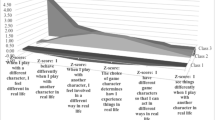Abstract
Over the last few years there has been an increasing interest in Massively Multiplayer Online Role-Playing Games (MMORPGs). These represent the latest Internet-only computer gaming experience consisting of a multi-player universe with an advanced and detailed world. One of the most popular (and largest) of these is Everquest. The data for this study were taken from a range of online gaming forums where individuals shared their experiences of playing EverQuest. Data were analyzed using interpretative phenomenological analysis (IPA), a method for analyzing qualitative data and meaning making activities. The study presents an IPA account of online gamers who perceive themselves to play excessively. The aim of the study was to examine how individuals perceived and made sense of EverQuest in the context of their lives. It is clear that the accounts presented by players and ex-players appear to be ‘addicted’ to EverQuest in the same way that other people become addicted to alcohol or gambling. Most of the individuals in this study appear to display (or allude to) the core components of addiction such as salience, mood modification, tolerance, conflict, withdrawal symptoms, cravings, and relapse.
Similar content being viewed by others
References
Anderson, C. A., & Bushman, B. J. (2001). Effects of violent video games on aggressive behavior, aggressive cognition, aggressive affect, physiological arousal, and prosocial behavior: A meta-analytic review of the scientific literature. Psychological Science, 12, 353–359.
Anderson, C. A., & Morrow, M. (1995). Competitive aggression without interaction: Effects of competitive versus cooperative instructions on aggressive behavior in video games. Personality and Social Psychology Bulletin, 21, 1020–1030.
Charlton, J. P. (2002). A factor analytic investigation of computer ‘addiction’ and engagement. British Journal of Psychology, 93, 329–344.
Davies, J. B. (1991). The myth of addiction. Reading: Harwood Academic.
Eysenbach, G., & Till, J. E. (2001). Ethical issues in qualitative research on internet communities. [On-line] http://bmj.com/cgi/content/full/323/7321/1103 [Last accessed 2003, September 08].
Funk, J. (1993). Reevaluating the impact of video games. Clinical Pediatrics, 32, 86–90.
Greenberg, J. L., Lewis, S. E., & Dodd, D. K. (1999). Overlapping addictions and self-esteem among college men and women. Addictive Behaviors, 24, 565–571.
Griffiths, M. D. (1997). Video games and children’s behaviour. In T. Charlton & K. David (Eds.), Elusive links: Television, video games, cinema and children’s behaviour (pp. 66–93). Gloucester: GCED/Park.
Griffiths, M. D. (1998). Violent video games and aggression: A review of the literature. Aggression and Violent Behavior, 4, 203–212.
Griffiths, M. D. (2003). The therapeutic use of videogames in childhood and adolescence Clinical Child Psychology and Psychiatry, 8, 547–554.
Griffiths, M. D. & Dancaster, I. (1995). The effect of Type A personality on physiological arousal while playing computer games. Addictive Behaviors, 20, 543–548.
Griffiths, M. D., Davies, M. N. O., & Chappell, D. (2003). Breaking the stereotype: The case of online gaming. CyberPsychology and Behavior, 6, 81–91.
Griffiths, M. D., Davies, M. N. O., & Chappell, D. (2004a). Demographic factors and playing variables in online computer gaming. CyberPsychology and Behavior, 7, 479–487.
Griffiths, M. D., Davies, M. N. O., & Chappell, D. (2004b). Online computer gaming: A comparison of adolescent and adult gamers. Journal of Adolescence, 27, 87–96.
Griffiths, M. D., & Hunt, N. (1998). Computer game “addiction” in adolescence? A brief report. Psychological Reports, 82, 475–480.
Hill, C. A. (1987). Affiliation motivation: People who need people...but in different ways. Journal of Personality and Social Psychology, 52, 1008–1018.
Jones, R. A. (1994). The ethics of research in cyberspace. Internet Research, 4(3), 30–35.
May, C. A. (1994). Addiction to video and computer games: A case study. Nervenheilkunde, 13, 314–317.
O’Connor, S. C., & Rosenblood, L. K. (1996). Affiliation motivation in everyday experience: A theoretical comparison. Journal of Personality and Social Psychology, 513–522.
Paccagnella, L. (1997). Getting the Seats of Your Pants Dirty: Strategies for Ethnographic Research on Virtual Communities. Journal of computer mediated communication, 3(1). Located at: http://www.ascusc.org/jcmc/vol3/issue1/paccagnella.html [last accessed February 23 2004].
Reis, H. T. (1998). Gender differences in intimacy and related behaviours: Context and process. In K. Dindia & D. J. Canary (Eds.), Sex Differences and Similarities in Communication: Critical Essays and Empirical Investigations of Sex and Gender in Interaction (pp. 203–231). Mahwah, NJ, US: Lawrence Erlbaum.
Salguero, R. A. T., & Moran, R. M. B. (2002). Measuring problem video game playing in adolescents. Addiction, 97, 1601–1606.
Smith, J. A. (2003). Qualitative psychology: A practical guide to research methods. London: Sage.
Smith, J. A., & Osborn, M. (2003). Interpretative phenomenological analysis. In J. A. Smith (Ed.), Qualitative psychology. A practical guide to research methods (pp. 51–80). London: Sage.
Tannen, D. (1990). You Just Don’t Understand: Women and Men in Conversation. London: Virago.
Yee, N. (2003). The Norrathian Scrolls: A Study of EverQuest (version 2.5). Located at: http://www.nickyee.com/eqt/report.html.
Yin, R. (1989). Case study research: Design and methods (2nd edn). Beverly Hills, CA: Sage.
Author information
Authors and Affiliations
Corresponding author
Rights and permissions
About this article
Cite this article
Chappell, D., Eatough, V., Davies, M.N.O. et al. EverQuest—It’s Just a Computer Game Right? An Interpretative Phenomenological Analysis of Online Gaming Addiction. Int J Ment Health Addiction 4, 205–216 (2006). https://doi.org/10.1007/s11469-006-9028-6
Received:
Accepted:
Published:
Issue Date:
DOI: https://doi.org/10.1007/s11469-006-9028-6




